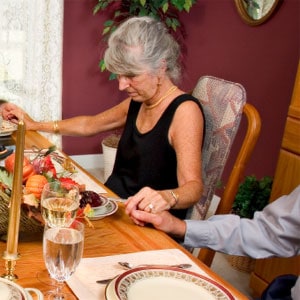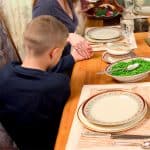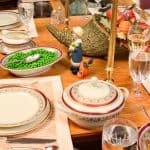
The True Story of the Pilgrims, Part 1
Who were the Pilgrims, and how did they get to America? Find out on today's broadcast when Barbara Rainey, author of the book "Thanksgiving: A Time to Remember," and her husband, Dennis, take a peek into history as they tell about the true story of the first Thanksgiving.
Show Notes
About the Host
About the Guest
-
Who were the Pilgrims, and how did they get to America? Find out on today's broadcast when Barbara Rainey, author of the book "Thanksgiving: A Time to Remember," and her husband, Dennis, take a peek into history as they tell about the true story of the first Thanksgiving.
-
Dave and Ann Wilson
Dave and Ann Wilson are hosts of FamilyLife Today®, FamilyLife’s nationally-syndicated radio program. Dave and Ann have been married for more than 38 years and have spent the last 33 teaching and mentoring couples and parents across the country. They have been featured speakers at FamilyLife’s Weekend to Remember® marriage getaway since 1993 and have also hosted their own marriage conferences across the country. Cofounders of Kensington Church—a national, multicampus church that hosts more than 14,000 visitors every weekend—the Wilsons are the creative force behind DVD teaching series Rock Your Marriage and The Survival Guide To Parenting, as well as authors of the recently released book Vertical Marriage (Zondervan, 2019). Dave is a graduate of the International School of Theology, where he received a Master of Divinity degree. A Ball State University Hall of Fame quarterback, Dave served the Detroit Lions as chaplain for 33 years. Ann attended the University of Kentucky. She has been active alongside Dave in ministry as a speaker, writer, small-group leader, and mentor to countless wives of professional athletes. The Wilsons live in the Detroit area. They have three grown sons, CJ, Austin, and Cody, three daughters-in-law, and a growing number of grandchildren.
-

Dennis and Barbara Rainey
Dennis and Barbara Rainey cofounded FamilyLife®, a ministry of Cru®. Their 43+ years of leadership enabled FamilyLife to grow into a dynamic and vital ministry in more than 109 countries. Together they have spoken at over 150 Weekend to Remember® marriage getaways and authored or co-authored more than 35 books, including best-selling Moments Together for Couples, Staying Close, A Symphony in the Dark, and Barbara’s most recent, Letters to My Daughters: The Art of Being a Wife...more
Who were the Pilgrims, and how did they get to America?
The True Story of the Pilgrims, Part 1
Pilgrim: We whose names are underwritten, the loyal subjects of our great sovereign lord, King James, by the grace of God of Great Britain, France, and Ireland, King Defender of the Faith, et cetera, having undertaken for the glory of God and advancement of the Christian faith and the honor of our king and country, a voyage to plant the first colony in the northern parts of Virginia do, by these present, solemnly and mutually, in the presence of God and one of another, covenant and combine ourselves together into a civil body politic for our better ordering and preservation and furtherance of the ends aforesaid.
Bob: And welcome to FamilyLife Today, thanks for joining us on the Tuesay edition. I was right about that, wasn't I? I need to ask the history professor, your wife, Barbara Rainey, who joins us on today's program. That was the Mayflower Compact, is that correct?
Barbara: That's correct, it was.
Bob: Thank you very much, and what was that – the Mayflower Compact? I mean – tell me the story of the Mayflower Compact. I don't even know what a compact is, other than a vehicle that you rent at Avis.
Barbara: It wasn't a vehicle they rented at Avis, since there was no Avis, but it was an agreement that they made, and the Mayflower Compact came about because, as they landed, after crossing the ocean, the Mayflower crossed the ocean, they realized they were not where they intended to be. They had set sail intending to land in Virginia, but because of the weather blowing them off course, they ended up 200 miles farther north on Cape Cod and realized that they did not have a patent, they didn't have a legal document with them, giving them the right to settle there, and when they realized that they, all of a sudden, became afraid that some of the people who were with them on the ship, who were hired as servants, would rebel and would not fulfill their obligations, and they needed these people to help build and plant. And so they really were desperate to sign some kind of an agreement that they could all come to so that they would be able to function as a unit once they began to build the colony.
Bob: It was a covenant, then, that they were making with one another.
Barbara: That's correct – where they promised certain things to one another under the authority of God.
Bob: And explain to our listeners why we're starting FamilyLife Today with hearing a portion of the Mayflower Compact and then asking your wife to give us a history lesson on that subject.
Dennis: Well, because Thanksgiving is a unique family holiday that your family can take advantage of to not merely celebrate with some food and some football and some family time, but it can be a celebration of faith, and not only of present-day faith, but of the faith of the founders, the faith of those who had the courage to get in a boat and to go to a land that they'd only heard about, to go establish religious freedom, who wanted to celebrate their faith in Jesus Christ without oppression from government. And Thanksgiving, I believe, gives us an opportunity, Bob, to uniquely – well, I think, not only pass along history to our children but also some great biblical principles of giving thanks in all things.
Bob: Barbara, you've written a book this year that tells the history of Thanksgiving. In fact, it's a book that you had to do a lot of research on, but you've been doing this research over the last decade because of your love for this holiday, right?
Barbara: Well, I've been doing some reading off and on because I wanted my children to know the truth about Thanksgiving. I wanted them to know what the pilgrims came for, who they were, why they risked everything to come to the New World. So I've been sort of doing some research so that I could help my kids know the real story.
Bob: Mm-hm, and we're hoping that the research you've done will become a part of a lot of Thanksgiving celebrations this year, Dennis, as families all across the country say, "We ought to make this day more than we've made of it in the past."
Dennis: You know, I think it would be a worthy prayer goal to begin to think about establishing a million families across our nation that would uniquely celebrate the spiritual heritage of our nation, and I think what Barbara has written in this book, along with the CD and the cards that go with it, that really uniquely help a family enter into the real spirit of Thanksgiving will not only equip them to do that, but it will practically give them some tools that – it's a no-fail situation as much as you can with a family. I mean, children can find fresh ways to destroy celebrations, but it's just a great way to celebrate this holiday.
One quick story I wanted to tell, because Barbara did a great deal of research on this, and one of the things she wanted to have in the book was a picture of Massasoit.
Bob: You're going to have to help me here – I remember hearing the name, but I forget exactly – was he Squanto's best man at his wedding or what?
Barbara: That I don't know – maybe he was. I don't know, Massasoit was the chief of the nearest tribe to where the pilgrims settled, and he was the one that they made the peace treaty with and did the negotiating with, and he was the one who brought his braves and wives and all of his people with him when they celebrated the first Thanksgiving. And, because of the peace treaty, he was very instrumental in their safety in the years to come, because he – part of the peace treaty was that they would mutually protect one another, and Massasoit did that.
Bob: And when you say Barbara wanted a picture of him …
Dennis: … well, she's a very visual person, and this book, of course, is filled with full-color pictures of different – well, different things that comprised the first Thanksgiving, and she wanted a picture of this chief in her book.
Bob: Yeah, but they didn't have any cameras back in those days. Are there paintings that exist?
Dennis: Well, she didn't know, and she was just wracking her brain about who we might know on the East Coast that could go to Plymouth, Massachusetts, where there is a foundation that has been formed to preserve a lot of the roots of our nation and wanted someone to go there and get a picture of this statue.
At the same time, Bob, back last summer an organization called and asked me to come to Cape Cod to speak, and I said, "I really can't. My schedule is too busy, but if you'll let me bring my wife and let me surprise her for this speaking engagement and bring her along with me, then I'll take it."
Bob: Oh, we talked about this on the radio, when you were getting ready to take her on this surprise trip, and you told everybody where you were taking her, and she wasn't listening that day.
Dennis: And she wasn't listening, so she didn't know where she was going. So I literally kept it a secret until we got to the airport in Atlanta, and I said, "Let's go to Providence, Rhode Island," and so we flew into Providence and, at that point, she still didn't know exactly where we were going, and I said, "You know, that picture of Massasoit that you want to take? We're going to go take it ourselves." And so I treated my wife to a getaway to go to Plymouth, Massachusetts, where we went to the colony that is a replica, as much as the historians can put together, and we had a wonderful time, Bob.
Bob: Mm-hm. And there's a picture of a statue of Massasoit in your book, right?
Barbara: That's correct.
Bob: Who took the picture?
Barbara: Well, actually, we took several pictures, so I'm not sure which one made the book. Dennis took some, and I took some, but he was a good sport. He went to all the museums with me and listened to all the presentations, and he was really a good sport. I had a ball.
Bob: The story of Thanksgiving – we have kind of a detached view of it. We have this second-grade picture of people wearing black clothing with hats with buckles on them. We really don't have a – I think back to Abraham leaving Ur, picking up his family and taking off, or the children of Israel leaving Egypt in the exodus. In a very similar way, the colonists who came and settled here had abandoned the life they had known, and it wasn't because they thought that the economic opportunities here would be better than where they lived, was it?
Barbara: That's for sure. They literally gave up everything – they literally walked away from it all, because there was a very real possibility that they might not live. I mean, they knew that. They knew that crossing the ocean could prove fatal, and they had to sell all their possessions in order to finance the voyage to pay for the food that they had to take on board, and when they arrived, there was nothing there. I mean, there were no houses, no people to welcome them, no food prepared, no store to go buy new clothes because their clothes had gotten rotten on the voyage after three months. I mean, it was just – they literally walked away from it all, and we can't relate to that today. I mean, just thinking about what they sacrificed is almost mind-boggling.
Dennis: I mentioned yesterday on FamilyLife Today that as Barbara reads the story when we celebrate Thanksgiving before we enjoy our Thanksgiving meal together, few things stir me – it's Barbara reading the story of getting on the Mayflower and all that they had to endure and battle and, I'll tell you, Bob, it's a lot like a coach in a locker room with a bunch of guys who are about to play the biggest game of their life, and it's this coach giving courage and faith and hope and the ability to step out and believe God for something great.
And as she reads this story every year, I sit at the other end of the table listening to her and, I want to tell you, the pilgrims' faith is such a model of sacrifice, self-denial, hardship, suffering. I mean, it wasn't a game they were playing. They didn't know where they were going to end up. As Barbara said, the land wasn't cleared, and yet, providentially, the hand of God had gone ahead of them and even the part of the story that our listeners who get this book are going to be able to read to their family is the story of an Indian tribe that had been mysteriously wiped out by a disease, and they literally landed in that spot where that tribe had been. And so there were no Indians to fight over the land, there was area that was somewhat cleared and preserved for them, and it was like God had already had a spot lined out for these courageous warriors of faith.
Bob: Barbara, as you did the research on this, and as you studied the story of Thanksgiving, there's some legend, some mythology that has grown up around Thanksgiving. The reality is we don't need a whole lot of legend or mythology. The real history, the story itself, is compelling, and it's heroic, isn't it?
Barbara: Yeah, it is, and those are two good words to describe it, because I was thinking, as Dennis was talking, about every year listening to the story. Well, for me, every year when I read the story, I'm motivated again to believe God for great things, because when you see someone else living a life of faith and laying it all on the line for Christ, it inspires you to do the same, and so every year when we read this story, we're all re-inspired, so to speak, to believe God for more.
And I think that's what the stories of those who have had great faith do for us, is they inspire greater faith in our lives, because we look at them and say, "Well, gosh, if they could believe God for this, then surely I can believe God for this." And it's motivating to want to exercise that faith in God and to believe Him for more things in our lives.
Bob: It also serves to remind us of how petty some of the things …
Barbara: … absolutely …
Bob: … that we get bent out of shape about are. You know, "Man, the car needs new brakes. I've got to pay money for the car to have" – or "I have to go without the car for a couple of weeks, because I can't afford the new brakes on the car." You know, you think about the pilgrims, they went without an awful lot and don't appear to have grumbled much about it.
Dennis: They barely survived that first winter, and as you read about that, and as you – it's almost like the way Barbara's written this – it takes you into the experience of not only the trip over in the boat and the conditions – you know, I think we sanitized this by virtue of some of the paintings we see. We see this ship – maybe there's a few waves, and, yes, there's a storm or two – but we forget that they had to live in the hold of the ship for nearly the entire trip over. They weren't allowed on the deck where the deckhands were running the ship.
Bob: And lest anyone think this was an ancient cruise ship or something, there were not meals served three times a day. They had bread along to eat, basically. There were not staterooms or cabins where everybody slept. The sanitary conditions had to be something of a challenge on board the ship. So the crossing itself was uncomfortable and risky, wasn't it?
Barbara: Yes, it was, and uncomfortable is a pleasant word. I think it was probably a whole lot more than uncomfortable. But one of the things that's so good about reading this story to your children is it fosters that sense of gratitude and of thankfulness, and that's the whole purpose of teaching our children about this story. I mean, obviously, we want them to know the real story of our nation's founding, but we really also want them to be grateful for what God has given them, because what we enjoy is a gift from God.
Dennis: The way Barbara has designed the story – there are three ways to share this with your family. You can do it over six days, six installments, as you move toward Thanksgiving, or there's a 30-minute version and then a 45-minute version that you can read to your family. And because I've heard the story, Barbara, I want you to share just a snapshot from the book about the trip over and what we were just talking about that better describes what the pilgrims were facing during that trip.
Barbara: This story about the Mayflower crossing the Atlantic is really where the book begins. So I'm just going to start there and read a little bit about the experience of actually crossing the Atlantic on the Mayflower.
"The Mayflower, a small wooden ship with billowing sails, was the vessel God used to bring a group of Christian believers to an unseen land far over the Atlantic. These Christian men and women, called pilgrims, believed that God was leading them to establish a new community where they could worship freely. Americans celebrate Thanksgiving every year because of the profound faith and uncommon courage of these Englishmen and women. They had no idea how God was going to use them to begin a new nation. They only knew God wanted them to go. So in September of 1620, after enduring many delays and difficulties, these pilgrims finally said their last goodbyes, boarded the Mayflower, and set sail for the New World.
The Mayflower was nearly halfway across the Atlantic when it met a ferocious storm. The wind wailed at 50 miles per hour, and waves towered 50 feet or higher. The waves' vicious pounding opened cracks in the ship's wooden hull. Icy cold seawater soaked the sailors and leaked into the passenger quarters below deck.
The ship rolled and tossed from side to side with the terrified pilgrims hanging onto anything solid, crying out to God to deliver them. The storm raged for days and became so intense that even the blasphemous sailors prayed. The pilgrims continued to pray and sing psalms, their voices barely heard above the thundering waves and howling wind.
After 65 days at sea for Plymouth, a total of 97 days from the first launch at Southampton, the pilgrims caught a glimpse of their destination – the new land where God would be worshipped freely and, in time, where freedom would flourish.
Shouting for joy and falling to their knees to pray, they celebrated by reading Psalm 100. "Shout joyfully to the Lord all the earth, serve the Lord with gladness, come before Him with joyful singing, know that the Lord Himself is God, it is He who hath made us and not we ourselves. We are His people and the sheep of his pasture. Enter His gates with thanksgiving and his courts with praise. Give thanks to Him, bless His name, for the Lord is good. His lovingkindness is everlasting, and His faithfulness to all generations.
Bob: Actually, what we just heard is from the audiobook version of "Thanksgiving, a Time to Remember," which has been narrated and dramatized, and I think our team did a great job with it, and I was looking at you Dennis, when we were listening to that story, and you were smiling. You just – you love hearing that story, don't you?
Dennis: Well, I do, Bob, but, honestly, I get emotional when I hear the story read, because you begin to think about what those people went through who were following God's call, and I just – I get emotional because I think, you know, our nation was founded by these people who are on a mission by God, and they had no idea what was wrapped up in their decision to be obedient.
But look – some nearly 400 years later. Because of their obedience God has used this nation to proclaim the Gospel to the four corners of the earth, and although we are a nation that is far from God, I believe this holiday is a unique call at a unique time in our nation's history to come back – to come back to the God who established it in the first place.
Bob: And I think that's what, Barbara, your hope for this book is – that the Lord would use it and use it in families at Thanksgiving, not just so that we would become nostalgic about our history or hear a story that inspires us, but hear a story that challenges us to live a life of risky faith before God. If the pilgrims' story does inspire us, it ought to inspire us to be men and women who are ready to lay down our own comforts for the sake of the Gospel, right?
Barbara: Mm-hm. It reminds me of a hymn that we used to sing in church when I was a child called "Faith of our Fathers," and we have a lot of fathers to imitate. We have our biblical fathers, Abraham and Isaac, and great men and women of faith in the Scriptures, but there are fathers whose faith we can imitate who founded our country. When you think of it in that way, these are men and women and children who risked their lives so that we might have the freedom to worship that we have, that we enjoy, that we so take for granted.
So I think that's exactly what I hope will be accomplished, is that people will not just grow in their understanding of the history of our country, although that, in and of itself, would be a great benefit, but primarily that our faith would grow as we see the kind of lives that these people lived, and that we would be motivated to imitate their faith.
Bob: I hope our listeners who don't already have a copy of our book will contact us to get one. The book is called, "Thanksgiving: A Time to Remember." You can go to our website at FamilyLife.com and click the red button that you see in the middle of the home page that says "Go," and that will take you to the area of the site where you can get more information about how to get a copy of this book.
Along with the book in the back there is an audio CD that is a music CD that contains several instrumental versions of some Thanksgiving hymns. I think there's one vocal version as well, but it's just great Thanksgiving music to have on playing in the house all during the Thanksgiving season.
And then our team decided that anyone who wanted to get a copy of your book, we wanted to make available at no additional cost the audiobook. So when folks contact us to get a copy of the book, we're going to send along not only the music CD but also the audiobook as well. So you've got that to listen to or to pass along to someone else.
Again, go to our website, FamilyLife.com for more information on all that's available from us here at FamilyLife. The home page, again, is at FamilyLife.com, there you'll see a red button in the middle of the screen that says "Go," and if you click that button it will take you to the areaof the site where you can get information about how to order copies of the book, the audiobook, how to get them sent out to you together.
The website, again, is FamilyLife.com. You can also call us at 1-800-FLTODAY for more information on how to get copies of these resources. You may want to use them as Thanksgiving gifts for friends or for family members.
Again, the toll-free number, 1-800-358-6329. That's 1-800-F-as-in-family, L-as-in-life, and then the word TODAY or if you'd prefer, you can order online at FamilyLife.com.
When you get in touch with us, someone may ask you if you want to help support the ministry of FamilyLife Today with a donation. We're listener-supported and so those donations are a part of what keep us on the air in this city and in other cities all across the country, and we appreciate those of you who are able to make a donation to the ministry of FamilyLife Today, and we hope that when you donate to us that's not doing anything that's taking away from your giving to your local church, which we think needs to be your top priority when it comes to giving.
If you are able to help with a donation of any amount this month, we'd love to send you a book for parents designed to help you pray more specifically for your children. It's a book called "While They Were Sleeping," and each week the book takes a different character quality and guides in you in praying for God to build that character quality into your child's heart and life. Again, we'd love to send you a copy of this book as our way of saying thank you for your financial support of the ministry of FamilyLife Today.
If you donate online, when you come to the keycode box on the donation form, type the word "sleep" in there so we'll know to send you a copy of this book. Or if you call 1-800-FLTODAY and make your donation over the phone, mention that you'd like the book for parents on praying for your children or the book, "While They Were Sleeping," and we'll be happy to send it out to you. And, again, thanks for your financial partnership with us here in the ministry of FamilyLife Today.
Now, tomorrow we're going to find out more about a familiar name from the Thanksgiving account. It's the name of Squanto. We'll learn his story tomorrow; I hope you can be with us for that.
I want to thank our engineer today, Keith Lynch, and our entire broadcast production team. On behalf of our host, Dennis Rainey, I'm Bob Lepine. We'll see you next time for another edition of FamilyLife Today.
FamilyLife Today is a production of FamilyLife of Little Rock, Arkansas, a ministry of Campus Crusade for Christ.
_______________________________________________________________
We are so happy to provide these transcripts for you. However, there is a cost to transcribe, create, and produce them for our website. If you've benefited from the broadcast transcripts, would you consider donating today to help defray the costs?
Copyright © FamilyLife. All rights reserved.
www.FamilyLife.com




